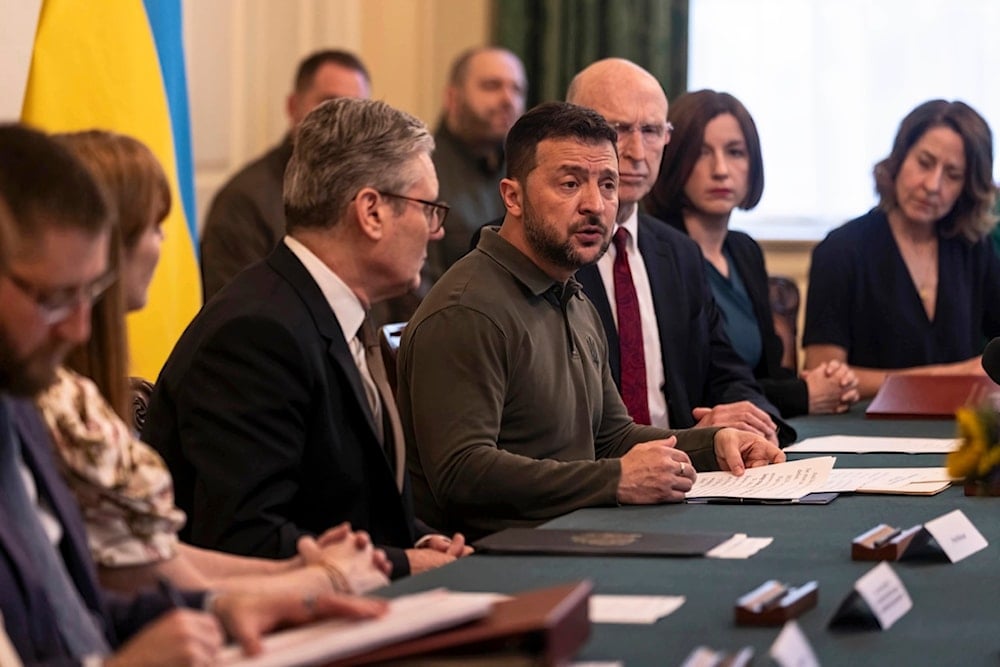Zelensky requests long-range missiles in meeting before UK cabinet
In a rare meeting, Ukraine's Volodymyr Zelensky addresses the UK parliament and requests permission to strike deep into Russian territory with long-range weapons.
-

Ukrainian President Volodymyr Zelenskyy addresses an extraordinary meeting of the UK Cabinet at 10 Downing Street in London, Friday July 19, 2024. (Pool Photo via AP)
Ukrainian President Volodymyr Zelensky addressed the United Kingdom cabinet on Friday, a move that demonstrates newly-elected Prime Minister Keir Starmer and London's support for Ukraine, as Zelensky asked Western allies for additional leeway on long-range capabilities.
Following a forum of European leaders at Blenheim Palace, Starmer continued his effort to elevate Britain's role in global affairs by inviting Zelensky to speak to his top ministers. According to Starmer's office, the last foreign leader to address the cabinet was US President Bill Clinton in 1997.
Reportedly, Zelensky reiterated a call for Western allies to allow long-range strikes deep into Russian territories and asked the UK to influence its allies to adjust their policy on the matter.
"Right now we are missing the main answer to this question and that is our long-range capability. Please convince the other partners to remove the limits," Zelensky pleaded at the meeting in Downing Street.
Moreover, Starmer assured Zelensky that his country would expedite the delivery of crucial aid to Ukraine. This follows the defense minister's statement earlier this month that the aid pledged by the previous Conservative government would be delivered within 100 days.
"Ukraine is, and always will be, at the heart of this government's agenda and so it is only fitting that President Zelenskiy will make a historic address to my cabinet," the prime minister said in a statement shortly before the meeting was convened.
Labour's support lies with Ukraine
Since taking office, Starmer reaffirmed the UK's unwavering support for Ukraine amid its war with Russia.
On Thursday, he announced that Britain would implement a new strategy to hinder Russia's attempts to bypass shipping sanctions. Additionally, Britain imposed sanctions on 11 vessels used for transporting Russian oil.
The new measures target Russia's "shadow fleet" by planning to share data on the network of often older tankers used for shipping Russian oil, enabling identification and action against individual vessels.
He also introduced the Defence Export Support Treaty, set to be signed by defense ministers, which will allow Ukraine to access £3.5 billion ($4.5 billion) in export finance to strengthen both countries' defense industries and increase production.
Last week at a NATO meeting, Starmer reaffirmed a commitment made by his predecessor, Conservative Rishi Sunak, to provide £3 billion annually in military support to Ukraine until 2030-31 and potentially beyond if necessary.
Labour to maintain decision allowing Kiev to hit targets in Russia
The new UK Labour government will not reverse the decisions of its Conservative predecessor regarding allowing Kiev to strike targets on Russian territory with weapons provided by London, the Financial Times reported last week.
In June, the United States and some other countries, including the UK under Rishi Sunak's premiership, allowed Kiev to use Western-donated weapons to strike inside Russian territory.
The newspaper mentioned that UK Prime Minister Keir Starmer signaled that the UK arms must be used in accordance with international humanitarian law for defense, but it will be up to Kiev to decide how to use the ammunition.
"Today and tomorrow and the next day is all about standing together with our allies, discussing practically how we provide further support for Ukraine," Starmer told reporters before he headed to Washington to attend NATO's 75th-anniversary summit.

 4 Min Read
4 Min Read









